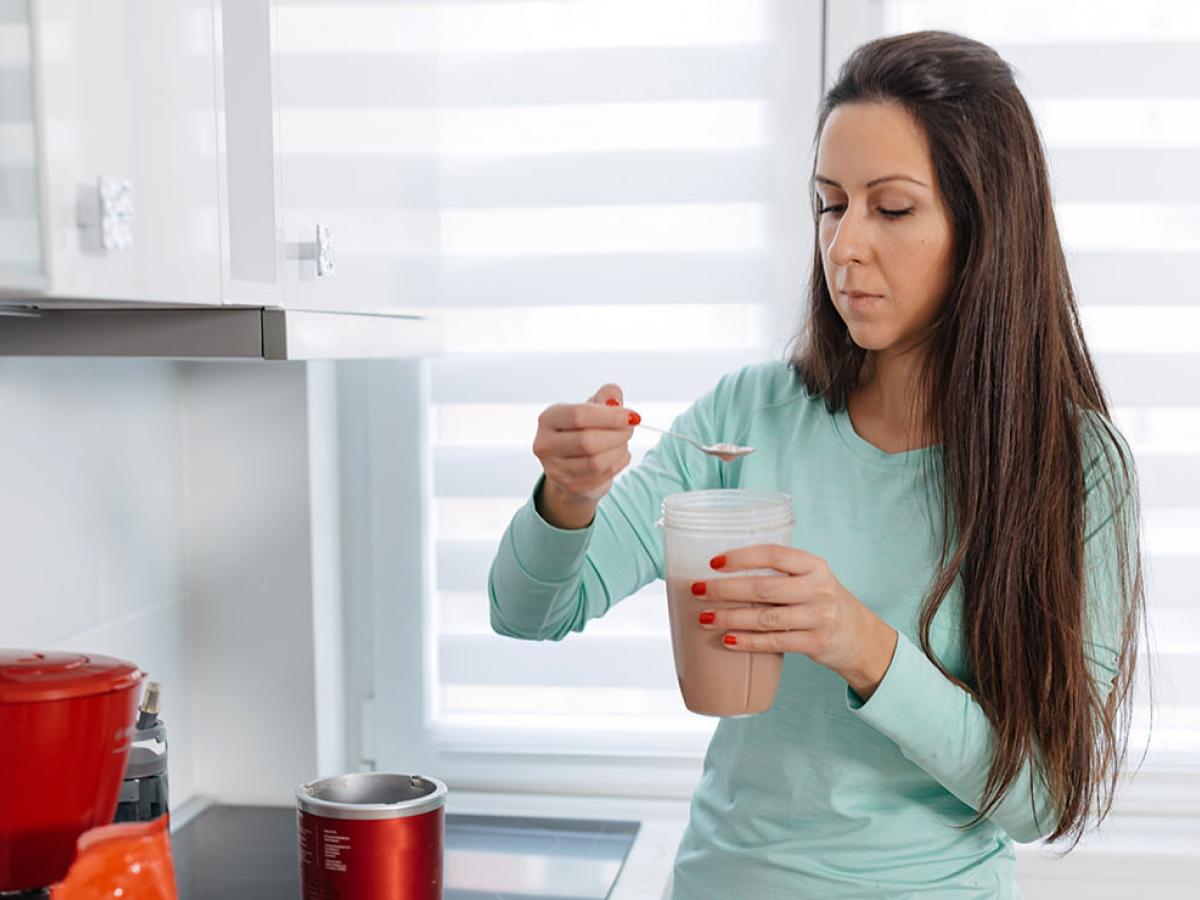November 19, 2025

Supplementing with creatine monohydrate — a natural performance enhancer — is commonly associated with athletes and people who are serious about their physical fitness. It optimizes the energy muscles have available for workouts and recovery.
What you may not realize is that creatine doesn't choose sides in the "brains vs. brawn" battle. Creatine is critical for your body's production of ATP (adenosine triphosphate) — the primary energy source for your cells and muscles. But it also benefits your brain, which does heavy lifting all day, every day.
"Creatine is a natural source of energy that has the reputation of just being for muscleheads and fitness fanatics," says Komal Ashraf, DO, MU Health Care neurologist and self-proclaimed gym rat. "But creatine supplements offer more than just gains at the gym, especially for your brain."
Dr. Ashraf shares six facts about creatine that everyone should know:
1. Creatine Benefits Your Brain in Several Ways
The more researchers study creatine, the more they learn about its effects on the brain. Generally, creatine helps with brain energy metabolism — how well your brain uses energy. It may also have protective benefits.
Experts believe creatine may help with brain function in several ways, including:
- Executive functioning: Research involving nearly 500 adults showed that supplementing with creatine has positive effects on memory, attention span and processing speed.
- Mental health: Growing data suggests that supplementing with creatine consistently reduces symptoms of depression, especially when used with selective serotonin reuptake inhibitors (SSRIs), a type of antidepressant.
- Recovering from brain injury: Supplementing with creatine before a brain injury occurs may protect your brain and reduce neural damage after the injury. The brain uses a lot of energy when in recovery mode — creatine helps ensure it gets the energy it needs.
"The brain is a huge consumer of energy in the body," Dr. Ashraf says. "Creatine helps replenish those energy sources to help us think better and keep our mental health strong."
2. Creatine Goes Where Your Body Needs It — That Includes Your Brain
When you think of energy, you likely think of the big skeletal muscles that help your body move. But your brain demands a lot of energy too, and creatine goes where the most energy is needed.
"Creatine is a natural performance enhancer that works throughout your body," Dr. Ashraf says. "Where it's used depends on where you need it, and your energy needs can change day to day and hour to hour."
For example, if you exercise at a high intensity, creatine helps provide energy for those muscles. If you are recovering from a brain injury or using your brain for work or studying, creatine may be primarily used to support neurological function.
3. Creatine May Be Especially Beneficial During Perimenopause and Menopause
Fluctuating estrogen levels can affect a woman's ability to store and use creatine effectively. It may explain why women might perform differently athletically or feel more tired during certain points in their menstrual cycle. (Seriously, is there anything estrogen levels don't impact?)

Creatine supplementation may be especially critical during perimenopause and menopause, when estrogen levels are low or nonexistent. Women of a certain age can experience brain fog, decreased energy, loss of muscle mass, and reduced bone density. Dr. Ashraf says creatine may help delay and prevent some of those issues — especially when it's paired with strength training.
"Creatine combats the secondary effects of hormonal changes in the body," says Dr. Ashraf. "It helps you build muscle mass, which increases your creatine stores and prevents the drop in energy and brain function that many women experience."
If you're already feeling the effects of hormonal changes, taking creatine may not be a cure-all. But it may keep your symptoms from progressing further or at such a rapid rate.
4. Women Naturally Store Less Creatine Than Men
The majority (95%) of your body's creatine is stored in your muscles. The rest can be found in the brain and other organs. If those stores get low, your body may not be able to produce the energy you need, when you need it.
Males and females are not equal when it comes to creatine storage. Women may have up to 80% lower creatine stores, possibly due to lower muscle mass, hormonal changes or lower dietary intake of creatine (meat and fish are good sources of creatine). That's why supplementing with creatine is especially critical for women. It can increase the amount of energy you have access to throughout the day.
5. Creatine Appears to Be Safe (and Beneficial) for Kids’ Brains
Studies focused on children and creatine are limited, but growing. The data we do have suggests that supplementing with creatine potentially offers health benefits and minimal adverse effects in children and adolescents. The Food and Drug Administration (FDA) classifies creatine as "generally recognized as safe" (GRAS), which applies to older children and adolescents.
"Even in the young, developing brain, creatine may strengthen mental health and brain function," Dr. Ashraf says. The neuroprotective benefits of creatine may also be helpful in adolescents who play contact sports and any child who experiences a brain injury.
Dr. Ashraf, who has studied creatine therapy as a potential treatment for people with traumatic brain injuries (TBI), says that children and adolescents who take creatine supplements experience quicker cognitive and mental health improvements after a brain injury. Supplementing with creating after a TBI can reduce post-traumatic headache, dizziness and fatigue.
6. The Key to Creatine Is Consistency
Supplementing with creatine daily is the best way to get the benefits. Dr. Ashraf says the typical dose is 5 grams (g) per day, which is the scoop-size found in most containers of creatine powder. While most children can safely take that same amount, she suggests starting with a half scoop (2.5 g) to make sure they tolerate it well.
"Daily dosing of creatine is critical, and it should be taken around the same time each day," Dr. Ashraf says. "Creatine is broken down in the body every 24 hours, so you'll only see consistent benefits with consistent use."
Her tips for choosing and using creatine supplements include:
- Use creatine monohydrate, which is the purest form of creatine and usually sold as a powder.
- Look for a third-party tested supplement, which is evaluated by an independent laboratory with no ties to the manufacturer.
- Be patient and assess the benefits after two weeks of consistent use.
"The safety profile of creatine supplementation is established, and there are benefits for all ages and genders," Dr. Ashraf says. "Researchers are still studying how to optimize the dose and timing, but creatine is a great option for a naturally occurring performance enhancer."
Next Steps and Useful Resources
- Want to discuss more with a doctor? Find one today.


